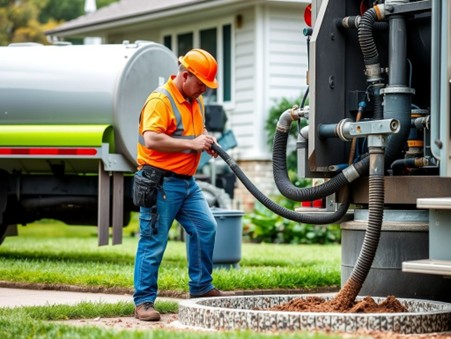Houston homeowners know that maintaining a septic system isn’t just a once-in-a-while task—it’s an essential part of protecting their property, avoiding costly repairs, and keeping things running smoothly year-round. But when is the best time to schedule septic tank pumping?
The answer depends on Houston’s unique climate. Unlike colder regions where winter freezes can complicate pumping, Houston’s seasons present different challenges: heavy spring rains, scorching summer heat, and increased household usage during the holidays. Timing your septic tank pumping service right can save money and prevent messy, inconvenient emergencies.
Here’s a seasonal guide to septic tank pumping and maintenance, tailored specifically for Houston homeowners.
How Houston’s Seasons Affect Your Septic System
Each season impacts septic tanks differently. Understanding these seasonal challenges can help with planning proactive maintenance before small issues turn into big (and expensive) problems.
Spring: Heavy Rains and Drain Field Concerns
Houston’s rainiest season can spell trouble for septic systems. Too much water saturates the drain field, making it harder for wastewater to disperse properly. This can lead to backups, slow drainage, and even system failure.
Spring Septic Tips:
- Schedule septic tank pumping before the heaviest rains arrive (typically March–May).
- Inspect the drain field for pooling water—standing water is a red flag.
- Direct rain runoff away from the drain field to prevent over-saturation.
Summer: Heat, Bacteria Growth & Water Usage Spikes
Houston summers are brutal—triple-digit temperatures are common. Extreme heat speeds up bacterial activity inside the tank, which is good for breaking down waste but can also lead to unpleasant septic odors if the system isn’t functioning properly.
High household water usage (think summer gatherings, extra laundry, and frequent showers) can also strain the system, causing premature clogs.
Summer Septic Tips:
- Reduce excess water usage—spread out laundry loads over the week instead of doing them all in one day.
- Avoid flushing non-biodegradable items (baby wipes, feminine products, grease) to prevent unnecessary buildup.
- Check for septic odors around the yard—strong smells indicate trouble.
Fall: The Best Time for Septic Tank Pumping in Houston
If a proactive approach is the goal, fall is prime time for septic tank pumping. Here’s why:
✔ The weather is mild—perfect for outdoor work.
✔ The ground is still dry, preventing pump trucks from getting stuck.
✔ Pumping before the holidays ensures the system can handle extra guests.
Fall Septic Tips:
- Schedule septic tank pumping in September or October—before demand spikes around Thanksgiving and Christmas.
- Test toilets and drains for slow flow—this could indicate a full tank.
- Consider a professional inspection to catch small issues early.
Winter: Mild, but Still Worth Checking
Unlike northern states where frozen ground makes pumping impossible, Houston’s mild winters allow year-round septic tank pumping. However, lower temperatures can slow down the breakdown of waste inside the tank.
The biggest winter issue? Holiday overload. More people in the house means more toilet flushes, dishwashing, and laundry—all adding stress to the septic system.
Winter Septic Tips:
- If pumping wasn’t scheduled in the fall, schedule septic tank pumping before the holidays.
- Check for slow drains—this could mean the tank is close to full.
- Keep an eye on the drain field for standing water or odors after holiday gatherings.
Best Times to Schedule Septic Tank Pumping in Houston
Timing is everything when it comes to septic tank pumping. In Houston, the best times to schedule service are:
✔ Early Fall (September–October): Ideal conditions, lower demand, and pre-holiday preparation.
✔ Early Spring (February–March): Before the heavy rains saturate the ground.
💡 Avoid last-minute scheduling in November and December! Holiday season demand drives up costs, and availability gets tight.
Expert Tips to Extend Septic System Lifespan
- Follow a precise pumping schedule:
- A family of four with a 1,000-gallon tank should schedule pumping every 3 years.
- A smaller household (1-2 people) may extend pumping to every 4-5 years if the system is well-maintained.
- A larger household (5+ people) may need pumping every 2 years to prevent buildup and backups.
- Don’t wait until there’s a problem—pumping on schedule prevents costly damage.
- Be mindful of what goes down the drain—grease, coffee grounds, and chemicals wreak havoc on septic systems.
- Schedule routine inspections—catching small issues early can save thousands in repairs.
- Protect the drain field—avoid parking cars or planting deep-rooted trees near it.
Final Thoughts: Plan Now, Avoid Problems Later
Houston’s climate makes septic tank pumping a year-round responsibility, but with smart scheduling, unexpected failures and expensive repairs can be avoided. Planning ahead ensures the septic system runs efficiently, saves money, and keeps the home hassle-free.
👉 Don’t wait for an emergency. Schedule septic tank pumping today and enjoy peace of mind!
